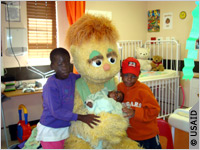16 October 2008
HIV-Positive Muppet Steals the Show in Johannesburg, South Africa
Loved by children, Kami helps them understand a painful, confusing subject

Johannesburg, South Africa — The most visible figure in the fight against HIV/AIDS in South Africa stands nearly 2 meters tall, wears a furry yellow suit, speaks seven languages and is loved by millions of children.
“Kami teaches me to take my medicines,” shouted a 6-year-old at the Mapetla Day Care Center, attached to the Soweto Hospice, outside Johannesburg.
“Kami teaches me to eat my vegetables,” another shouted.
“Kami says go to the doctor when I’m sick,” screamed a third.
The children were ecstatic to have standing before them Kami, the star of Takalani Sesame, the South African spin-off of the American children’s television program Sesame Street. Kami showed up at the Soweto Hospice and the Mapetla Day Care Center on October 13 to commemorate World Hospice and Palliative Care Day and to thank the U.S. government for its part in combating the scourge that is sickening and killing millions of South Africans.
Seeing Kami towering above them dressed in bright garb that none had ever seen up close, the children debated loudly with each other whether Kami was a human being or not. Kami gestured, nodded, hugged and then waved goodbye, leaving the children’s question unanswered and their eyelids fluttering.
Kami made her debut on South African television and radio in 2002, the result of a cooperative effort between the South African Broadcasting Corporation (SABC) and Sesame Street and the Muppets in the United States. The U.S. Agency for International Development (USAID) played a key role in coordinating the linkage.
“Kami is making a huge difference in the lives of millions of children here,” said the SABC’s Jeffrey Molawa. “She herself lives with HIV. She is a 5-year-old orphan who has been adopted by other characters on Takalani Sesame. She is intelligent, bright, loveable and humble. The children who watch and listen to her learn that it is not a shame to have HIV/AIDS.”

There is hardly a family in South Africa that has not been affected by AIDS, and Molawa’s is no different. His 9-year-old nephew, who is HIV-positive, lost his mother when he was 2 and was taken in to be raised by his grandmother. Three years later, his grandmother was diagnosed with the dreaded disease.
“This is very difficult to explain to a 6-year-old child, because his whole world is falling apart. It is difficult to say, ‘It will be all right,’” Molawa said. “That is why Kami is making a big difference in the lives of South Africans. Parents can sit down with their children and use Kami to explain AIDS to their children, and teachers are using Kami in their classrooms to talk [about] it.”
In addition to demonstrating the importance of diet and medication, Kami’s greatest contribution is helping to dispel the stigma attached to AIDS.
“Kami challenges society by saying, ‘I am a kid, just like you,’” according to Molawa. In one episode, she is seen getting sick and other children come to the hospital and sing to her. In the following episode, she gets out of the hospital and goes to the market to buy healthy fruits and vegetables.
Nonhlanhla Duba, the manager of the Soweto Hospice, said Kami and her cohorts are helping to change popular attitudes toward the disease.
“We are beginning to see change,” she said. “There is more openness and disclosure about HIV/AIDS. There is a slowing rate of infection. Kami is making a difference.”
USAID’s Malik Jaffer noted that when the United States began funding HIV/AIDS work under the President’s Emergency Program for AIDS Relief (PEPFAR) in 2004, about 30,000 South Africans were on medication. Since then, the figure has risen to nearly a half million, which, he said, is an indication that people are stepping forward and getting tested and treated.
Nikiwe Dube, the supervisor of the Mapetla center, where Kami visited, said she has seen improvement in the community’s attitudes toward HIV/AIDS during the past several years. “When we opened, people did not want to associate with us. Now they want their children to come here. They see that this is a place where they receive love and care. They learn, get food and medication and get well enough to return to their homes and go to school,” she said.
The Soweto Hospice and Mapetla Day Care Center have written manuals about HIV/AIDS care that are being adopted by the South African and neighboring governments.
The United States plans to stay involved in funding HIV/AIDS work with a budget of $38 billion worldwide for the next five years.
